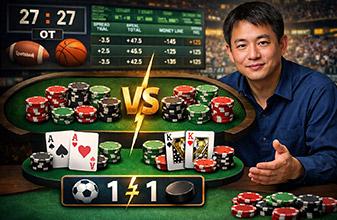Relative-Value Sports Bettors

King Yao is the author of Weighing the Odds in Hold‘em Poker, and Weighing the Odds in Sports Betting. He uses his experience from making millions in financial derivative markets and translates it into gambling. Since he left his trading position in 2000, he has been playing poker and betting on sports. He travels to Las Vegas frequently, especially during football season.
Let’s discuss basic principles of sports betting. All sports bettors should know the information below. All other types of casino advantage players, including blackjack players of all skill sets, which includes card counters, should have good working knowledge of Expected Value as well. You should not be betting online or anywhere else without this fundamental knowledge.
Relative-Value Sports Bettors
Relative-value sports bettors do not need to handicap well in order to have an edge in sports betting. Instead, they use other information to help them make money. This includes the use of historical information, simulations, logic and comparable betting lines in different markets.
Database keepers
Database keepers have large databases of games with lines, results and other information they think is pertinent. Some database keepers use this information as part of their handicapping process. Others use this information for relative-value plays in side bets. Examples of side bets are the first half and the first quarter in football and the run line in baseball. With access to so much information, database keepers can look at historical results to figure out how the actual point spread, money line or total is related to the side bet. The bigger the sample size, the more comfortable database keepers are with their results. Database keepers invest time and/or money keeping their databases current. They have to be proficient at interpreting the data; having a good database but interpreting the data incorrectly produces negative-EV ideas and bets.
Buying points
Getting positive EV by buying points in a football or basketball game requires understanding the value of each point. Database keepers can get these values from their historical databases. You can also get these values from other sources that do not require a massive database.
Long ago, point buyers off the 3 in the NFL did well because some sportsbooks allowed bettors to buy any half point for just ten cents. When the line on an NFL game is 3, buying the dog to +3.5 or the favorite to -2.5 for just ten cents is worthwhile due to the frequency at which the favorite wins by exactly 3. Bettors could blindly bet both sides off the 3 and have positive EV. But nowadays, most sportsbooks have made it more expensive to buy off the 3.
Teasers
Relative-value players can beat teasers (parlays with additional points added to each team, but with worse odds) if they have a good idea of the distributional frequency of the possible results of the game at hand. This is similar to the knowledge required for buying points. No handicapping is necessary, but with the inclusion of good handicapping, the relative-value player can add some teasers that are not as obvious or eliminate the worse teasers from his portfolio.
This is part of an occasional series of articles.
Excerpted with permission from the e-book version of Weighing the Odds in Sports Betting by King Yao, edited for this format.
For more about online sports betting, please visit www.latestsportsbonuses.com











Please log in or register to leave a comment